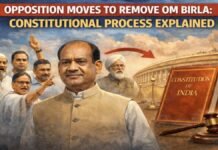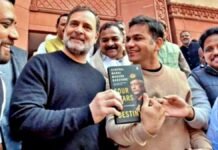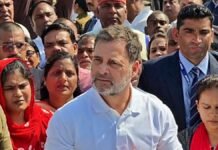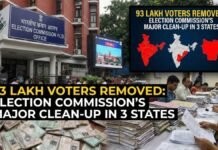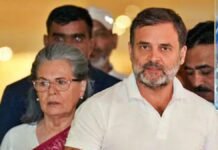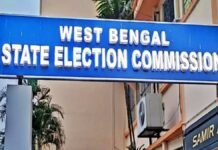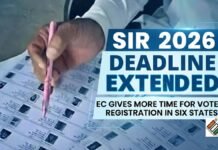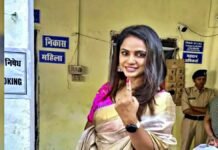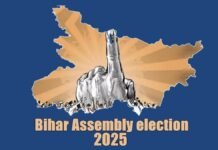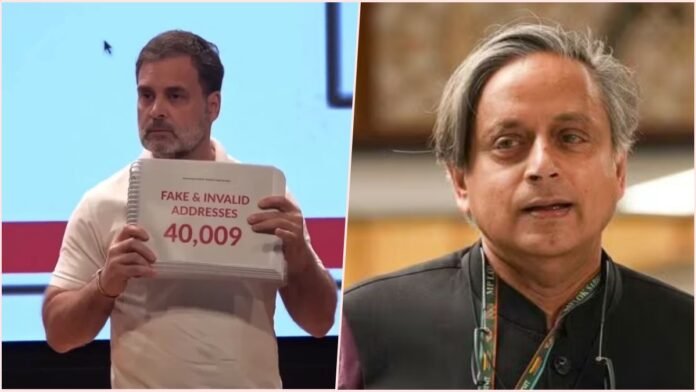
Key Points
- Shashi Tharoor joined the opposition MPs’ march to the Election Commission, demanding credible answers to Rahul Gandhi’s “vote theft” allegations, not procedural affidavits.
- Tharoor said the data cited by Rahul Gandhi comes from the EC’s own records and should be examined by the Commission itself.
- Rahul Gandhi has alleged large-scale manipulation, including duplicate entries and fake addresses, citing a 100,250-vote “vote chori” example in Karnataka’s Mahadevapura; EC officials have sought an affidavit and specifics, triggering a political face-off.
- Several opposition MPs were detained during the protest in Delhi as the INDIA bloc pressed for a “clean, pure” national voters list and full access to electronic rolls.
- Tharoor’s stance follows weeks of speculation over his political positioning after leading an all-party outreach on Operation Sindoor; his latest remarks reaffirm alignment with Congress on electoral integrity.
New Delhi: Congress MP Shashi Tharoor sharply criticized the Election Commission (EC), arguing the poll body should address Rahul Gandhi’s “serious questions” on alleged vote manipulation with substantive answers rather than insisting on oaths and affidavits. Speaking during the INDIA bloc’s protest march to the EC headquarters over Bihar’s electoral roll revision and broader “vote chori” claims, Tharoor said the integrity of India’s polls is “too precious” to be compromised and that lingering doubts must be removed credibly.
Tharoor underscored that the figures Rahul Gandhi cited are sourced from the EC’s own data and urged the Commission to examine its records instead of focusing on formalities. “We want answers, not attacks,” he said, reiterating that restoring public confidence requires clear, data-backed clarifications from the EC.
The Protest And The EC’s Pushback
Opposition parties marched from Parliament to the EC, demanding a transparent voters list and full access to electronic rolls nationwide, with Rahul Gandhi declaring the agitation a fight to protect the Constitution and “One Man, One Vote”. During the demonstration, multiple MPs, including leaders from allied parties, were detained by Delhi Police.
The EC and state CEOs have sought a signed declaration from Rahul Gandhi and specific voter details under election rules, arguing that formal submissions are needed to initiate proceedings on alleged roll irregularities. Karnataka’s CEO issued notices asking Gandhi to furnish documentary evidence for claims like double voting in Bengaluru, noting a preliminary inquiry found a named voter had cast a ballot only once and questioning documents shown in Gandhi’s presentation.
Separately, the EC told the Supreme Court that non-inclusion in Bihar’s draft rolls during a Special Intensive Revision is not equivalent to deletion, defending that the draft is a work-in-progress and that law requires availability for inspection and sharing with recognized parties, not public disclosure of omitted names with reasons.
Political Context: Tharoor’s Positioning
Tharoor’s robust defense of Rahul Gandhi’s questions comes after weeks of speculation stemming from his leadership of an all-party parliamentary delegation abroad to brief global counterparts on the Pahalgam attack and India’s response under Operation Sindoor. During that outreach, Tharoor publicly backed India’s precise strikes and national security stance while stressing his opposition role, a balance that fueled chatter about his political bearings; his present remarks firmly align him with the Congress-led demand for electoral transparency.
What Rahul Gandhi Alleges
Rahul Gandhi alleges systemic “vote theft” through methods like duplicate entries, fake addresses, and bulk registrations, citing EC-sourced data and demanding national electronic voter lists and videography records for a 10-year span to prove manipulation claims. He has refused to sign an affidavit on what he calls the EC’s own data and accused authorities of evasion, asserting some state election websites were taken down after his exposé charges the EC apparatus has countered by asking for formal, verifiable submissions.
Why It Matters
- Electoral trust: Tharoor argues that doubts about voter lists erode the EC’s credibility and must be resolved with transparent, data-driven responses, not procedural hurdles.
- Legal process vs. public confidence: The EC’s stance emphasizes rule-bound affidavits and specifics to act; the opposition insists the EC already holds the data and should proactively clarify discrepancies.
- Escalating confrontation: Detentions during the march and continued notices to Rahul Gandhi indicate a widening institutional-political clash that could shape upcoming electoral reforms and oversight expectations.
Latest Developments To Watch
- Court proceedings on Bihar roll revisions and the EC’s comprehensive reply timeline.
- Any EC move to share broader electronic voter lists or methodology notes addressing allegations of duplicate or fake entries.
- Follow-up notices and inquiries from state CEOs seeking granular evidence on specific electors named in the opposition’s presentations.
Engaging SEO Headlines
- “We Want Answers, Not Attacks”: Tharoor Backs Rahul, Rips EC Over “Vote Theft” Row
- INDIA Bloc March, Detentions In Delhi As EC Seeks Affidavit From Rahul Gandhi
- Tharoor Says EC Must Examine Its Own Data On Voter Manipulation Claims
- Karnataka CEO Issues Notices; Rahul Demands Full E‑Voter Lists Nationwide
- After Operation Sindoor Diplomacy, Tharoor Reasserts Congress Line On Poll Integrity


































